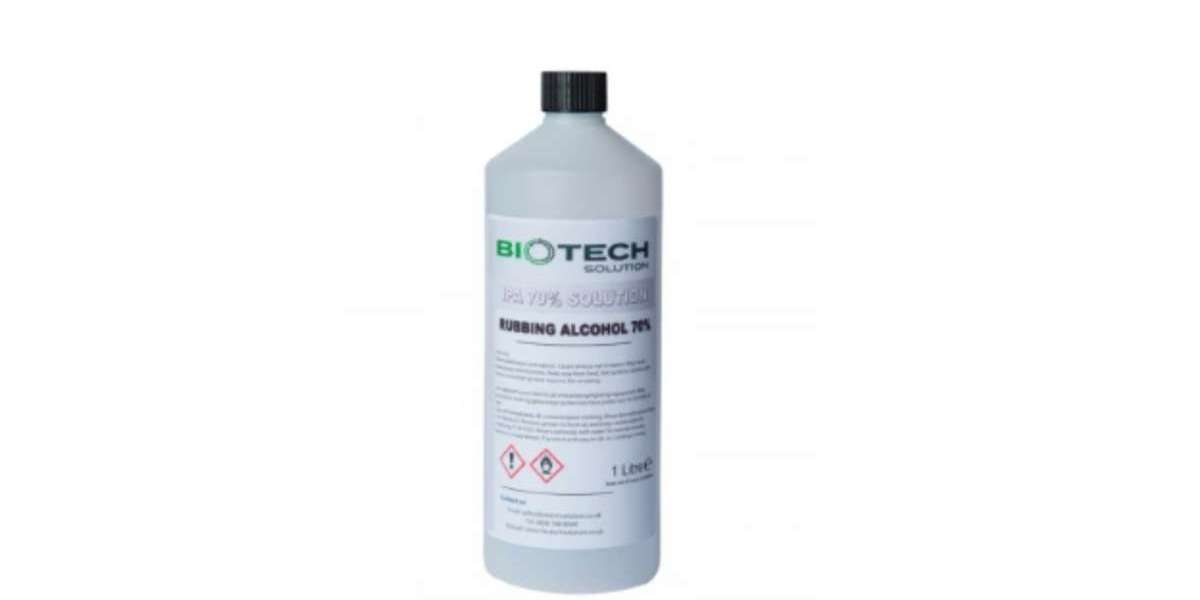Rubbing alcohol is one of the most underrated essentials in every UK home. This simple liquid can do more than just disinfect a cut. From cleaning electronics to removing stains, it’s a true multi-tasker. With rising awareness around hygiene and cleanliness, demand for rubbing alcohol has soared. According to Statista, disinfectant sales in the UK increased by 34% in the past three years. Clearly, households are turning to practical solutions—and rubbing alcohol stands at the top.
Let’s explore how you can use rubbing alcohol for smarter, safer, and more efficient living.
What Is Rubbing Alcohol?
Rubbing alcohol is a solution made primarily of isopropyl alcohol or ethanol. In the UK, it usually contains 70% alcohol by volume, making it strong enough to kill bacteria and viruses. It's available in pharmacies, supermarkets, and online.
It evaporates quickly, leaving no residue behind. That makes it perfect for cleaning and disinfecting surfaces without water.
Disinfecting Surfaces at Home
One of the most common uses of rubbing alcohol is cleaning high-touch surfaces. It’s ideal for killing germs on:
Doorknobs
Light switches
Mobile phones
Remote controls
Worktops
Spray it directly on surfaces or use a cloth dampened with it. Wait 30 seconds to one minute before wiping it off. This method ensures proper disinfection.
Cleaning Electronics Without Damage
Most cleaning sprays can damage electronic devices. But rubbing alcohol evaporates fast, making it safe for:
Keyboards
Screens
Smartphones
Earbuds
Apply a small amount to a microfiber cloth and gently wipe your device. Avoid over-saturating the cloth.
Removing Stubborn Stickers and Labels
Ever tried peeling off a label only to have sticky glue left behind? A bit of rubbing alcohol solves that. Just apply a small amount, let it sit for 1–2 minutes, and rub gently. The adhesive breaks down, leaving the surface clean.
Cleaning Makeup Brushes
Makeup tools collect oils and bacteria. Using rubbing alcohol is a fast way to sanitize brushes and sponges. Dip brushes in a small bowl of the solution and swish them around. Let them air dry completely before use.
Deodorizing Shoes and Bags
Shoes, gym bags, and even gloves can trap sweat. Rubbing alcohol acts as a deodorizer by killing odour-causing bacteria. Spray lightly inside shoes or bags and let them air dry.
Removing Permanent Marker Stains
Whether it's a marker on the wall or clothes, rubbing alcohol can help. Dab some on a cotton ball and blot the stain. Repeat until the stain fades. It works on most non-porous surfaces too.
Freshening Up Your Home
Spray rubbing alcohol mixed with a few drops of essential oil into the air or on fabrics. It dries fast and leaves a clean scent behind. This is safer than many commercial air fresheners filled with chemicals.
Cleaning Mirrors and Windows
Skip the store-bought glass cleaners. Rubbing alcohol leaves no streaks and cuts through grime. Mix it 1:1 with water and spray on glass. Wipe using a microfiber cloth for a crystal-clear shine.
Emergency Ice Pack
Need a quick ice pack? Mix 2 parts water and 1 part rubbing alcohol, seal it in a plastic bag, and freeze. It stays flexible, making it perfect for sore muscles or minor injuries.
First Aid Must-Have
Rubbing alcohol remains a key first aid essential. It helps clean minor cuts, scrapes, and insect bites. Always use clean cotton or gauze and avoid applying on deep wounds.
Dr. James Baird, a UK-based GP, says, “Rubbing alcohol is highly effective in home care, but it should be used properly. For skin contact, always use it diluted unless advised otherwise.”
Safety Tips When Using Rubbing Alcohol
Avoid inhaling fumes: Always use in a ventilated space
Keep away from flames: It’s highly flammable
Don’t drink it: Never use internally
Keep out of children’s reach
Store in a cool, dry place
Where to Buy Rubbing Alcohol in the UK
You can find rubbing alcohol in:
Boots
Superdrug
Amazon UK
Local pharmacies
Some larger supermarkets (Tesco, Asda)
Look for at least 70% isopropyl alcohol for general cleaning. Prices range between £2 to £5 depending on brand and quantity.
Is Rubbing Alcohol the Same as Surgical Spirit?
In the UK, many confuse rubbing alcohol with surgical spirit. Both are similar, but there’s a key difference:
Surgical spirit often contains added ingredients like castor oil or menthol
Rubbing alcohol is more pure and better for cleaning electronics and surfaces
How Often Should You Use Rubbing Alcohol?
It depends on the use:
Daily: Phones, handles, keyboards
Weekly: Makeup brushes, remote controls
Occasionally: Ice packs, air fresheners
Always test a small area first to avoid damage.
Rubbing Alcohol vs. Other Disinfectants
Let’s compare it with common cleaning options:
Bleach: Strong but harsh; not suitable for electronics
Antibacterial sprays: Effective but may contain added chemicals
Vinegar: Natural but less effective against viruses
Rubbing alcohol sits in the middle—strong, fast-drying, and safe when used properly.
FAQs
Can you use rubbing alcohol on the skin?
Yes, for minor cuts. Avoid daily use as it can dry the skin.
Is rubbing alcohol effective against viruses?
Yes, especially at concentrations of 70% or more.
Is it safe for pets?
No. Keep pets away from freshly cleaned areas until dry.
Final Thoughts
Every UK home should have a bottle of rubbing alcohol. Its affordability, versatility, and effectiveness make it a standout product. From hygiene to household care, the uses are endless. Whether you're cleaning your gadgets or disinfecting a cut, it's a smart choice.
Use it wisely, store it safely, and let it simplify your routine.








